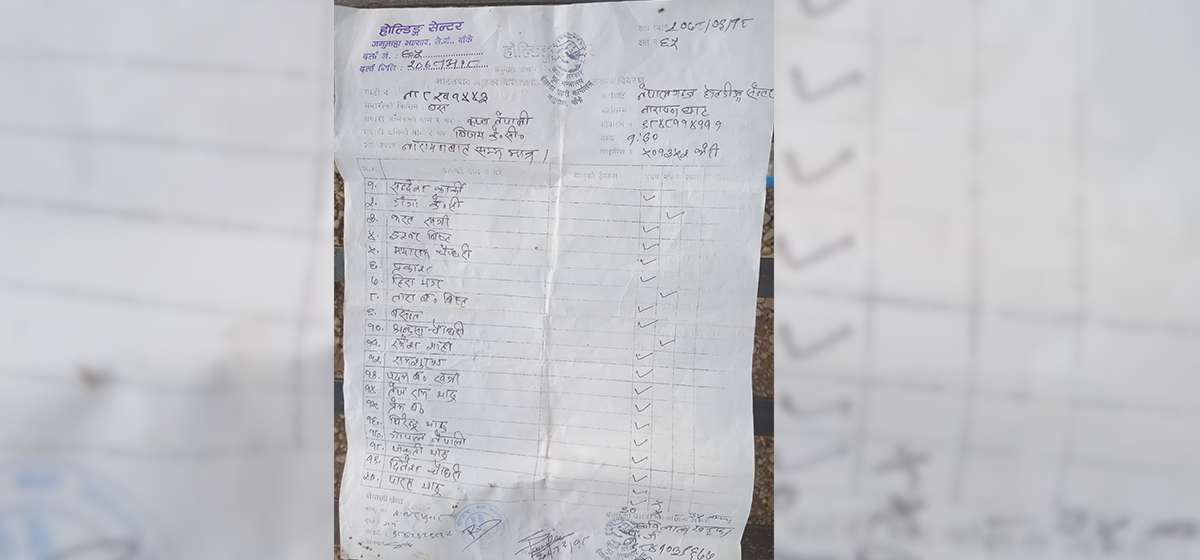BANKE, July 4: The government of Nepal has not taken any immediate decision to resume the operation of public vehicles, following the spread of the second wave of the novel coronavirus (COVID-19) infection. Likewise, the local administration of Banke has also not allowed any movement of vehicles outside the district as well. However, according to traffic authorities, more than a 100 passenger vehicles leave Banke on a daily basis.
As mentioned by traffic authorities, most of the drivers receive permission to transport stranded citizens to their respective destinations. Some drivers have no idea regarding the possession of passes about how and where the pass is received from. Some drivers say that they have received their passes from ‘middlemen’. “I have a pass to drive my passengers from Nepalgunj to Surkhet and will return alone from there,” a jeep driver said. “I got it from a middleman. I have no idea how he managed to get it from the authorities,” he added.
According to the driver, he had to pay Rs 5,000 to a middleman for the pass. The local administration will only grant the vehicle pass with the consent of the destination district for important works, urgent works and for workers and patients. Also, a holding center at the Jamunah checkpoint near the Nepal-India border has also started to allow the stranded citizens to travel to their respective destinations.
According to Dirgaraj Upadhayaya, spokesperson for the District Administration Office of Banke, the administration has stopped issuing passes. “The full operation of transport services will not resume unless the government comes up with a decision,” Upadhayaya said, while also stating the ongoing operation of public vehicles under the odd-even rule inside the district, “It is not easy to stop everyone,” he added.
NOC adopts automated pricing mechanism

The government has not made any decision regarding the operations of the transport industry. In such a situation, public vehicles have started to run with full capacity.
When asked by a fellow citizen, why doesn't the police stop such vehicles and just impose fines on them? Upadhayaya replied, “People are more afraid of suffering from hunger than the disease.” “Some of them don't even wear masks. If only they can understand it for themselves. How many vehicles can we stop?” he asked.
Earlier, the newly-appointed chief of the District Police Office, Banke, had expressed his commitment to stop the middlemen. However, the distribution of passes from intermediaries have increased within a week of his arrival.
The holding center at Jamunha checkpoint consists of two Nepal army personnel including an Assistant Inspector of Police and a police constable. According to Prithvi Budha, assistant inspector of police at the Jumanah checkpoint, transport services have resumed in the area as well.
“Vehicles are asked to present their passes and their entry is recorded,” Budha said. “We see about 30 vehicles leaving the area on a daily basis, but that number is increasing daily since the ongoing prohibitory order was loosened to some extent,” he added.
According to Budha, as many as 50 drivers use certified documents to operate regularly on a daily basis. Also, no amount of money is needed to pay at the holding center for any kind of verification purpose. Vehicles are certified with the number of coupons brought from the bus park by members of the Transport Entrepreneurs Committee or the driver owner themselves, he said.
Transportation fares spiked
Vehicle operators have increased the fares by three-fold for passengers after ‘buying’ the vehicle passes. A single ticket to Dang, Surkhet and Dhangadhi from Nepalgunj currently ranges from Rs 700 to Rs 1400. Earlier, transport entrepreneurs used to charge Rs 300 to Rs 500 for the same districts.
“We take passengers to their destinations, but have to return empty,” a driver heading to Dang from Nepalgunj said. “We charge high fares from the passengers as we have to pay the middlemen for the passes as well,” he added.

A vehicle pass issued to transport entrepernuers by the holding center in Jamunah checkpoint on the Nepal-India boirder. Photo: Ganesh/Nagrik



































